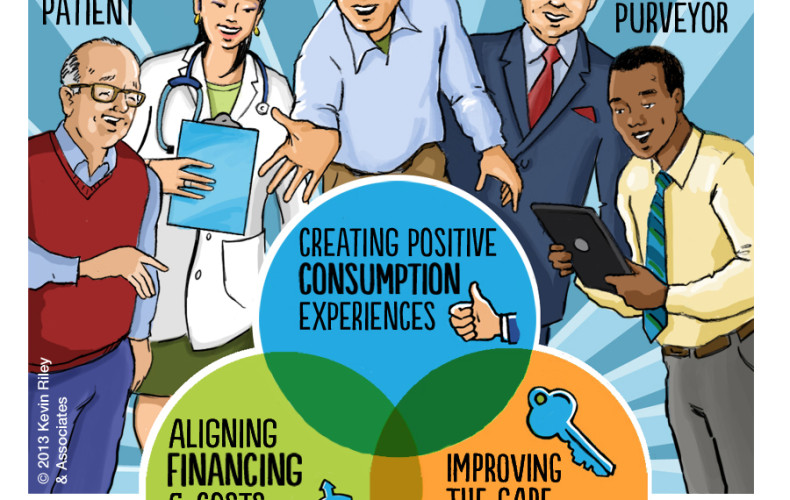Hello to all. I am working on a new project I am calling modelH. This project is a dynamic collaboration between me, Innovation Excellence, Batterii, and a bunch of great healthcare thinkers.
Batterii’s CoCreation® Platform powers this project, and my Business Model Method for Collaborative Healthcare Innovation guides it. Innovation Excellence’s worldwide Community of disruptive innovators fuels it.
Our goal is to create a business model canvas specifically designed to generate and evaluate healthcare business models that can create positive consumption experiences, improve care delivery, and align and control costs. We then want to use our framework to co-create and test some innovative healthcare business models. The results will be compiled in a book to be released in 2014.

What is the problem we are trying to solve?
The American healthcare “ecosystem” in its basic form operates along 3 themes: care consumption, care delivery, and care financing. These domains are interdependent points of interaction along a value chain of healthcare. To impact one point, you really impact them all. Make no mistake – healthcare is a business! The problem is that very few people create business models that are considerate of all three points of view – and certainly no one has come up with a framework to make this easier.
Also, across the value chain of healthcare, there are four key stakeholders: patients, providers, payers, and purveyors. To put it in simple terms, the party who consumes the product of healthcare (the “patient”) is usually not the one who pays for it, or at least not most of it. The party that pays for it (the “payer”) is best served when it is not used, and is therefore motivated to push for less of it. Furthermore, the parties that deliver it (the “provider”), and the parties that support its delivery (the “purveyor”), are not aligned to place realistic boundaries on its cost, thus forcing the system into bankruptcy. Due to its divided nature, the ecosystem is overrun with inefficiencies and creates dis-incentives across themes and between stakeholders so that each maximizes their own value, often at the expense of the others.
But the system is not so much broken as made up of working parts not working together. Our diagnosis of the problem is a misalignment of the ecosystem’s building blocks. Our prescription is to reset these building blocks into a better working order. The outcome will be a healthy and aligned ecosystem that is both market-driven and cost conscious.
There is no better time to try and fix the healthcare system than amidst the current environment of reform. The team behind the modelH CoCreation Forum feels that a collaborative and systematic approach is the only means to overcome the interconnectivity barriers that exist to get past where others have failed. We have the means to accomplish this collaboration though Batterii’s CoCreation® Platform. We have the right approach for how to systemically validate a healthcare-specific business model through Kevin Riley’s Business Model Method for Collaborative Healthcare Innovation. And through Innovation Excellence and our own networks, we have access to a community of radical innovators with representation across all key stakeholders, as well as business model experts, ready to engage with us in this year-long project.
This is where you come in! But before we ask you to get involved, let’s talk more about how we can solve this problem – together.
So, step up to the plate an get involved.
- Click here to join (the big red button on the side!): http://bit.ly/modelHForum
- Follow us online at: https://twitter.com/ModelHForum
- And you can read more about this project in my linked posts: modelH (part 2) | modelH (part 3) | modelH (part 4)
To your health,
The Team at imagine.GO






